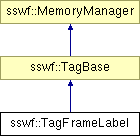
libsswf: sswf::TagFrameLabel Class Reference
#include <libsswf.h>

Public Member Functions | |
| virtual ErrorManager::error_code_t | Save (Data &data) |
| Save the frame label in the specified Data buffer. | |
| void | SetFrameLabel (const char *label) |
| This function defines the name (label) of a frame. | |
| TagFrameLabel (TagBase *parent) | |
| Initializes the frame label object. | |
| virtual swf_type_t | TypeFlags (void) const |
| This function returns the type of a TagFrameLabel object. | |
Private Member Functions | |
| virtual ErrorManager::error_code_t | ParseTag (swf_tag_t tag, const Data &data) |
| Parse data from a file into a FrameLabel tag. | |
| virtual ErrorManager::error_code_t | PreSave (void) |
| Ensure the minimum version is valid. | |
Private Attributes | |
| char * | f_label |
Detailed Description
This tag is used to name a frame in a movie. The advantage is to be able to go to that frame by name later.
Constructor & Destructor Documentation
| TagFrameLabel::TagFrameLabel | ( | TagBase * | parent | ) |
Member Function Documentation
| ErrorManager::error_code_t TagFrameLabel::ParseTag | ( | swf_tag_t | tag, | |
| const Data & | data | |||
| ) | [private, virtual] |
This function does nothing since the FrameLabel tag has no data.
- Parameters:
-
[in] tag The tag that generated this call [in] data The Data buffer from the Flash file being loaded
- Returns:
- An error if one occurs, or ErrorManager::ERROR_CODE_NONE
Implements sswf::TagBase.
References sswf::Data::ByteSize(), sswf::ErrorManager::ERROR_CODE_BAD_STRING, sswf::ErrorManager::ERROR_CODE_NONE, f_label, sswf::MemoryManager::MemAlloc(), sswf::MemoryManager::MemClean(), and sswf::Data::ReadBytes().
| ErrorManager::error_code_t TagFrameLabel::PreSave | ( | void | ) | [private, virtual] |
This function checks that the movie is at least a version 3 Flash animation.
If the anchor extension is used (i.e. the label name starts with a '#') then the minimum version must be 6.
- Returns:
- An ErrorManager::error_code_t, ErrorManager::ERROR_CODE_NONE when no errors occur
Reimplemented from sswf::TagBase.
References sswf::ErrorManager::ERROR_CODE_NONE, f_label, and sswf::TagBase::MinimumVersion().
| ErrorManager::error_code_t TagFrameLabel::Save | ( | Data & | data | ) | [virtual] |
This function saves the label in the specified Data buffer.
If the name has not been set or set to an empty string, then this function has no effect (nothing is saved.)
If an anchor is saved, the label string is followed by one byte set to 1.
- Parameters:
-
[in,out] data The Data buffer where the frame label is saved
- Returns:
- An ErrorManager::error_code_t, ErrorManager::ERROR_CODE_NONE when no errors occur
Implements sswf::TagBase.
References sswf::ErrorManager::ERROR_CODE_NONE, f_label, sswf::Data::PutByte(), sswf::TagBase::SaveString(), sswf::TagBase::SaveTag(), and sswf::TagBase::SWF_TAG_FRAME_LABEL.
| void TagFrameLabel::SetFrameLabel | ( | const char * | label | ) |
This function can be used to define the name of a frame.
The name can really be anything, but it is strongly suggested that you start the name with a letter and only use letters, digits and underscores for full compatibility.
When the name starts with a '#' character, it is taken as an anchor. This anchor can be specified on the URL when accessing the Flash animation.
Set the frame label to an empty name (or do not set it) to avoid saving it in the output movie.
- Parameters:
-
[in] label The frame label/name
References f_label, sswf::MemoryManager::MemFree(), and sswf::MemoryManager::StrDup().
| TagBase::swf_type_t TagFrameLabel::TypeFlags | ( | void | ) | const [virtual] |
This function returns SWF_TYPE_CONTROL.
- Returns:
- SWF_TYPE_CONTROL
Implements sswf::TagBase.
References SWF_TYPE_CONTROL.
Member Data Documentation
char* sswf::TagFrameLabel::f_label [private] |
Reimplemented from sswf::TagBase.
Referenced by ParseTag(), PreSave(), Save(), SetFrameLabel(), and TagFrameLabel().
The documentation for this class was generated from the following files:
Generated on Wed Mar 18 15:13:59 2009 for libsswf by
 1.5.5
1.5.5 